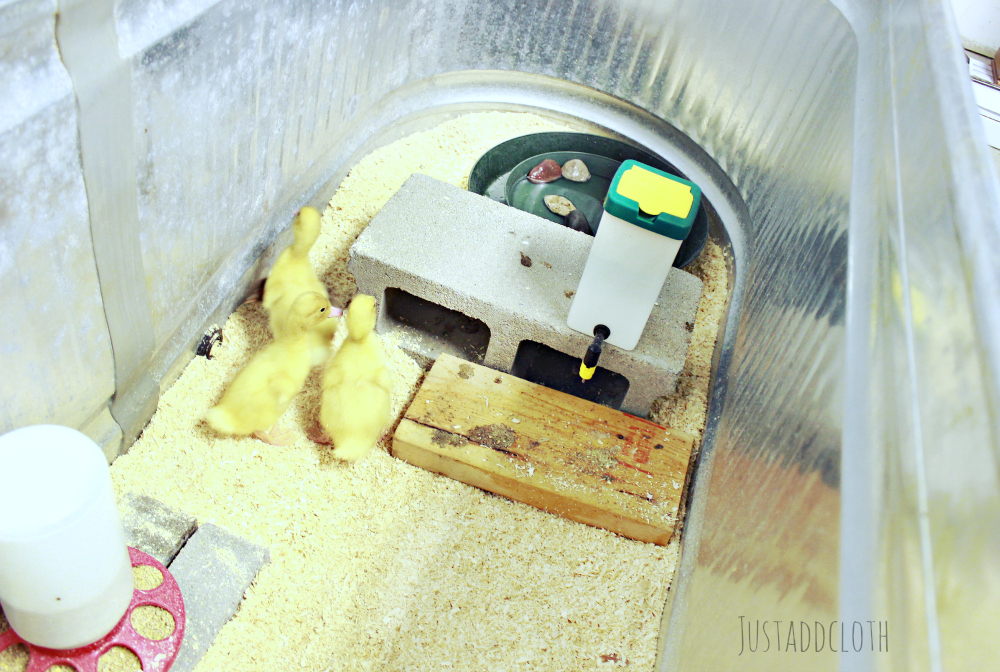 Duckling brooders need separate wet and dry areas.
Duckling brooders need separate wet and dry areas.
Have you already already raised chickens from baby chicks, and want to try your hand at ducklings? It is a bit different, but not so much for you to worry. There are really only a few differences in duckling brooders compared to chick brooders. You can even raise them together in one brooder if you are careful and attentive.
Duckling Brooders Compared to Chick Brooders
To make a brooder for any baby fowl you require:
-a container
-heat source
-absorbent litter/bedding
-water for drinking (and head dunking for ducks)
-chick feed
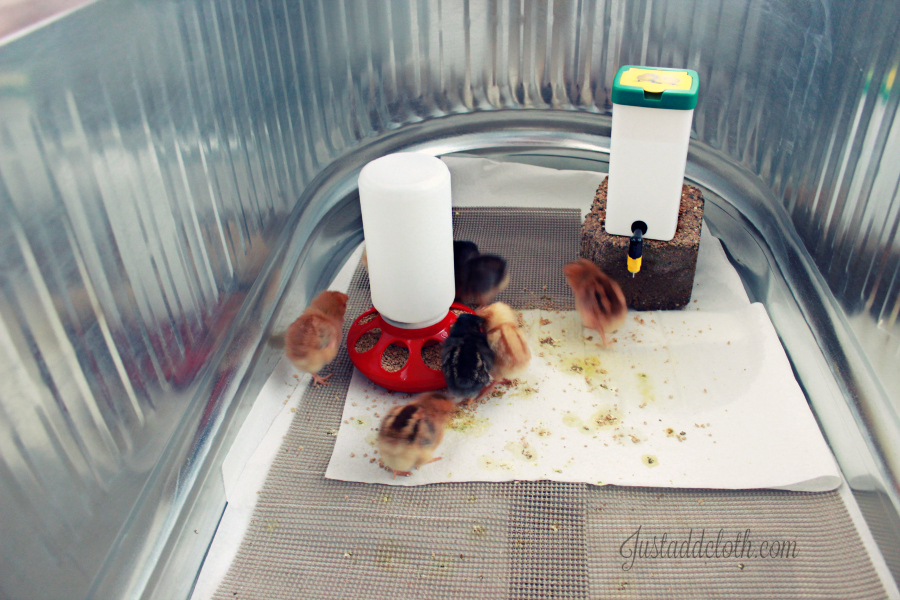
Container
The container that makes up the brooder needn’t be fancy. It just needs to keep them safely contained, have plenty of air flow, have access to bright days and dark nights, and a dry warm area for sleeping. Due to the way ducks splash, a duck brooder should have more surface area in the brooder or a way to control the dampness. Ducklings splash so much, it is best to have the wet area separate from the dry area or even create a head dunking station so that they can’t make much mess at all. You could even chose to have daily duck bath time for a couple weeks in the tub, but that will get difficult past week two since ducks grow so fast.
We use a large 6ftx2ft metal water trough. This worked fine for five pekins for about a month until they became a wet sloppy mess every two hours. If you live in a cold climate like we do, I recommend not getting your ducklings until June so you can move them outside at three weeks.
Chicks on the other hand, grow more slowly, so their space will last longer. And they don’t need such a separate dry and wet space, so you can actually get away with less surface area with chicks if you give them a place to roost by week three.
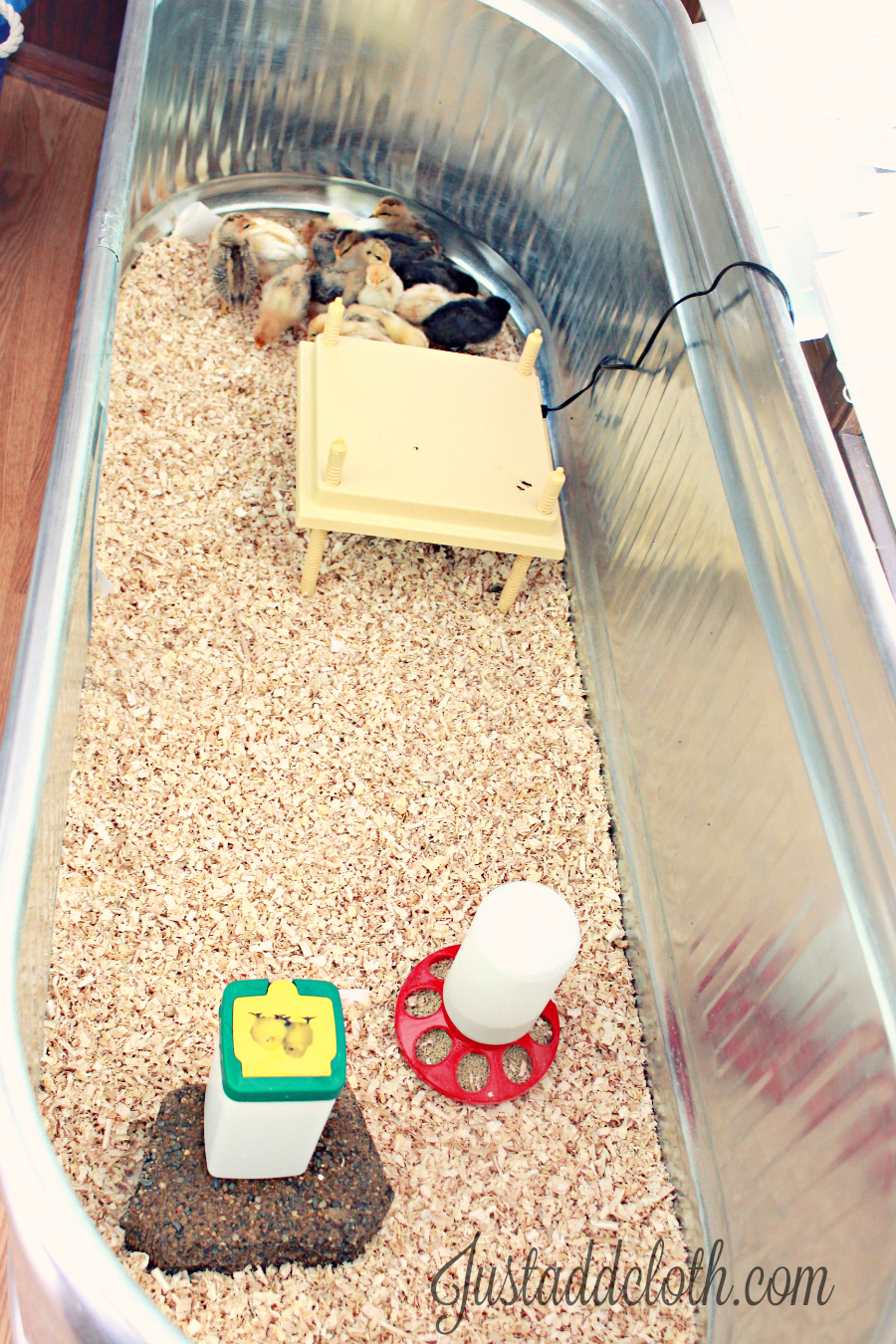
Heat
I am not a fan of heat lamps since they can be a fire hazard and they tend to heat up the entire area. If the entire brooder is hot, the birds have no where to go if they feel too warm. I use a heat plate that sits up on stilts. This way the ducklings can frolic and play, then choose to go the warm area. Ducklings run warmer than chicks and stop huddling under their heat source much sooner. They can easily get over heated.
Keep the warm area dry and away from the water. Ducks can splash their water quite far. You don’t want the warm bedding getting wet. The moisture combined with warmth can grow mildew and mold very quickly which can be very bad for young fowl’s respiratory systems.
Since chicks don’t require splash water, they can have their water closer to the heat plate and can have a larger heated area all together.
Litter
Use paper shreds and straw hay as litter. Ducklings are hardier than chicks and grow very fast. They can easily trample over hay at just a couple days old unlike baby chicks. I layer newspaper over the metal of the trough since plain hay on the metal floor is too slippery. I lay paper towels over the newspaper for a grippier surface. Then we lay straw over the paper. We keep the water on one end and warmer on the other end. Once the ducklings are over two weeks old, you can use pine shavings as well. You can actually use shavings from day one, but I found the duckling ate the pine shavings for the first few days, so I like to wait on those. With chicks, you can use shavings right away.
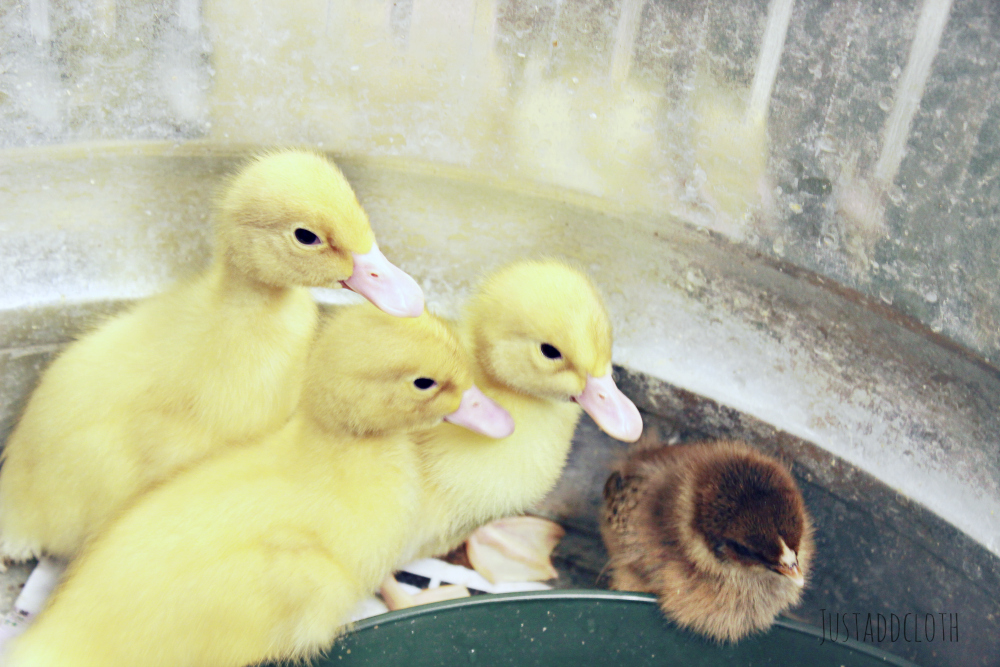
Water
A nipple waterer is perfect for chicks since it keeps the water clean and reduces mess. You can use a nipple waterer for ducks and they figure it out quickly. However, they like to clean their nostrils and splash their heads in Water. You can use a container to create A drinker with a hole just the size of their head so they can head dunk, but not get into the water. But you will need to make a new one every few days since they grow quickly. I prefer to use a shallow tray for Water instead.
Water can’t be too deep at first. We use a plastic plant pot tray. It is low enough for small ducklings to crawl over the side, but not deep.
I add some river rock so they can dip bills and splash a little for fun, but cannot not possible drown.
Change water three times a day to keep it fresh. Ducks poop a lot in their water. Plus, they splash a lot of the water out.
You could also choose to only have a nipple waterer in the brooder, but give the ducklings a designated pool party time each day. You can fill a sink or tub with an inch of water (more as they get older) and let them have a 20 minute supervised swim & splash. When they are done, make sure to put them back under the heat source. This not only keeps your brooder much cleaner, but handling the ducklings so often will also make them friendlier as they get used to you.
You generally do NOT want a tray of water in a chick brooder though. The chicks are more at risk of getting chilled from getting all wet and can die more easily from such a thing. Overall, you want the whole brooder to be far dryer with chicks.
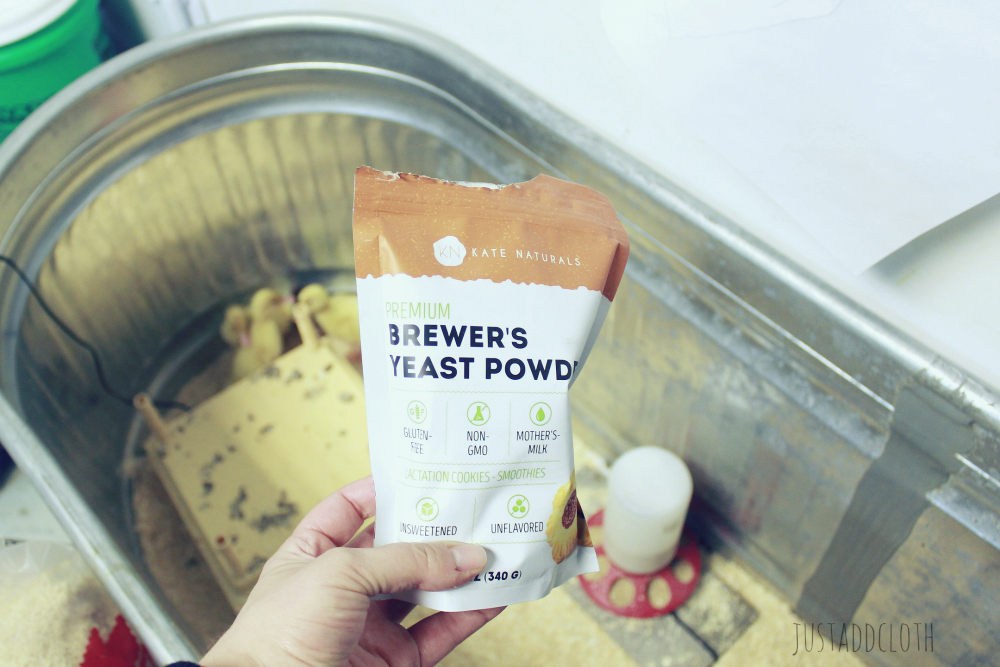
Food
With just chicks, you can get away with just about any chick feed crumbles.
Food must be UN-medicated for ducks. A basic un-medicated chick feed crumble is fine for the whereas a medicated feed can kill the ducklings.
Some people add brewers yeast to the feed for extra niacin since ducks need more niacin than other fowl. They require it for wing and feather development. You can use the same brewers yeast mothers use for breast milk production. Peas also are high in niacin and give the ducks something fun to bob for in their water. Wait until the duckling are 10 days old before giving them whole peas though so they don’t choke.
Feed can be left available all day for the first month, but make sure they have access to water whenever feed is present. Once we move our ducks out to the run, we put them on the same feeding schedule as our chickens.
Moving Out
So long as the weather is nice, you can move your ducklings outside into a protected run at around 3 weeks old. Honestly, they get so big so quickly that you’ll want them out of your house by this point anyway. The duck poop is far smellier than chick poop and all the splashing quickly turns into poop splattering.
Our chicks would never be ready to be outside this early, The earliest I would move chicks out to our protected run would be about seven weeks, if that. Even at eight weeks, a pullet will be smaller than a three weeks old duck.

Ducklings and Chicks together???
You can do it if it is only a small few in a large brooder. Otherwise the splashing can be an issue for chicks. I have a lone Easter egger chicken I raised in the brooder with my pekins and she was fine being soaking wet all of the time, but she was a tough little chick. She still hangs out with the ducks since they were her buddies before any other chickens. I also have raised Barred Rocks with pekins in a single brooder. It is doable, but requires a bit more work. Especially since ducklings grow more quickly than chicks.
First, I would only ever raise a hardy breed of chick with ducklings in the brooder. Don’t try to raise dainty little silkie chicks or guinea keets in the duckling brooder. They will be guaranteed to be wet and chilly and likely not make it.
Only use a larger brooder with separate wet and dry areas so the chicks can be away from any splashing.
Possibly set up two different warming areas with one running warmer for the chicks.
As for feeding, the chicks can eat the brewers yeast with the ducklings just fine. It won’t hurt them. However, I would hold off on the whole peas until the chicks are over five weeks old. The ducks can handle them at a few days old, but the chick might try to eat one and choke.
The ducklings will seem like aggressive bullies taking all the food from the chicks, until the chicks figure out they can peck with sharp little beaks.
Honestly, brooding them together can be more work and hassle. Since the ducks are so messy, it can be rough on the chicks, but it is very doable especially if you only have a few and have warm weather to move them outside fairly quickly.
One thing I have learned about raising multiple kinds of fowl, is they are all tougher than we think. I have found all baby fowl require far less coddling than the experts tells us.

